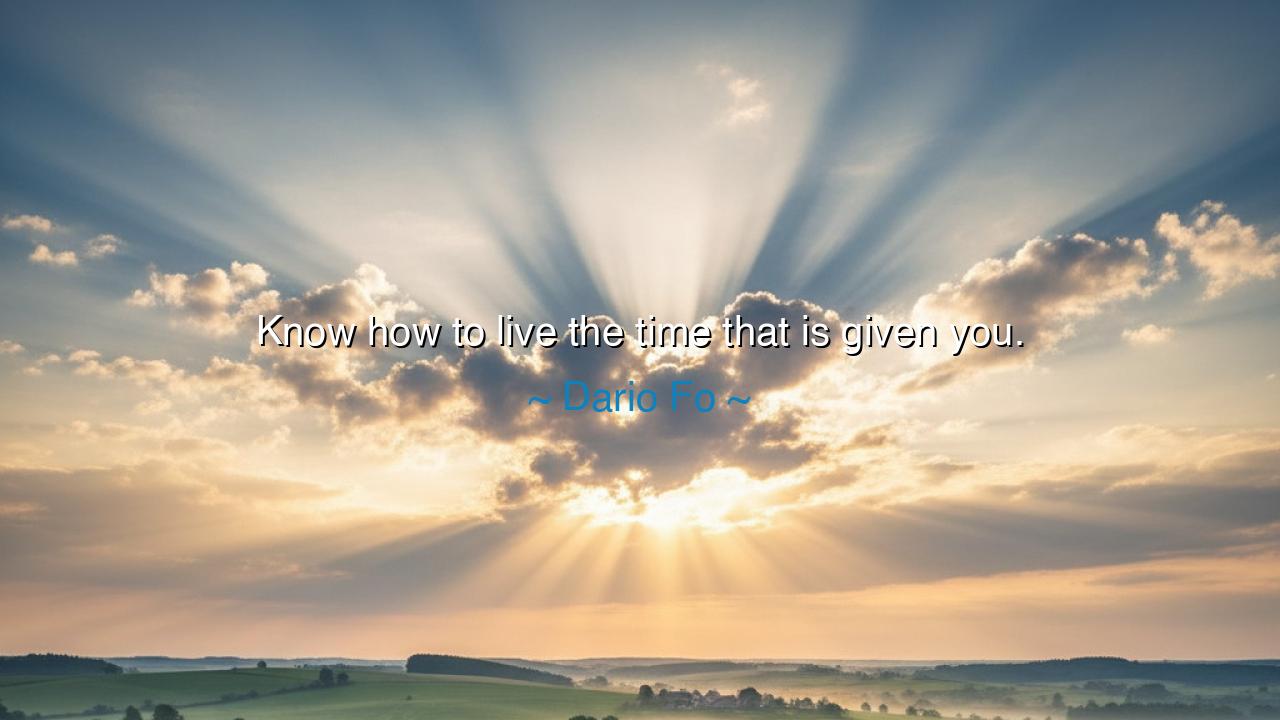
Know how to live the time that is given you.






Hear, O listeners, the timeless words of Dario Fo: “Know how to live the time that is given you.” In this utterance, there is not only counsel but a commandment, born of the wisdom of one who saw life as a stage, fleeting and unpredictable. Fo, playwright and poet, jester and sage, knew that time is not ours to control, nor to extend according to our will. It is given, as a gift and as a limit. And what matters most is not how much is given, but how wisely, how fully, how bravely it is lived.
The origin of these words rests in Fo’s art. His works were filled with satire, laughter, and defiance of authority, yet beneath the jest was a profound respect for the brevity of life. He lived in an Italy scarred by conflict and oppression, and through his plays he reminded people of their humanity, their dignity, their power to resist. His words are born of experience: that one must live the time given, not in fear of its end, but in joy, purpose, and rebellion against waste.
Consider the life of Anne Frank. Confined within the narrow walls of her hiding place, she did not despair completely at her limited time. Instead, she filled her days with writing, with dreaming, with the fire of hope. Though her life was cut short, the diary she left behind became a beacon for millions. She did not control the length of her time, but she lived it with depth. She embodied Fo’s truth: to know how to live the time that is given is to leave a mark that outlasts the fleeting span of years.
History gives us another example in Marcus Aurelius, emperor and Stoic philosopher. Surrounded by wars, betrayals, and the constant shadow of death, he wrote in his Meditations that life is but a brief moment between two eternities. Yet he urged himself—and us—to use each hour well, to act with justice, courage, and humility. He lived not as though endless time were his, but as one who understood its preciousness. He too knew how to live the time given, not in vain hope for more, but in reverence for what was already present.
The meaning of Fo’s words is therefore both urgent and liberating. To “know how to live” is to awaken to the truth that waiting for tomorrow is folly. How often men say, “When the moment is right, I will act, I will love, I will create.” Yet the moment is never perfect, and time slips through their hands. Fo reminds us that the hour to live is now, not in some imagined future. The present is the only certainty, and to waste it is to deny life itself.
The lesson for us is clear: do not measure your life only by the years that may lie ahead. Measure it by the fullness with which you inhabit this day. Fill your time with acts of kindness, with the pursuit of truth, with courage against injustice, with the creation of beauty. Even if your span is short, its weight can be infinite. Life is not in the counting of hours but in the meaning you breathe into them.
Practical counsel follows. Rise each morning and ask: how shall I honor this time? Do not delay your words of love, for silence is the thief of days. Do not postpone your work of creation, for unfinished dreams are swallowed by the river of years. Seek wisdom daily, serve others freely, and laugh as if eternity depends upon it. In this way, you will not only live time, but master the art of living it well.
So let Fo’s words echo like a bell in your heart: “Know how to live the time that is given you.” For the gift is short, yet it is enough. Live not in regret for what has passed, nor in fear for what may come. Live the hours you hold, and they will shine beyond your life, a testament that you understood the mystery of existence—not to grasp eternity, but to embrace the fleeting gift of time with all the fire of your soul.






AAdministratorAdministrator
Welcome, honored guests. Please leave a comment, we will respond soon